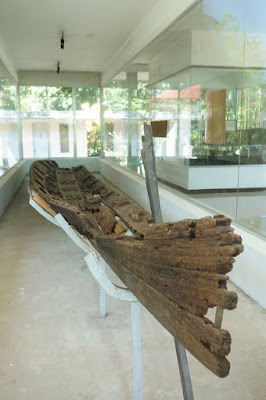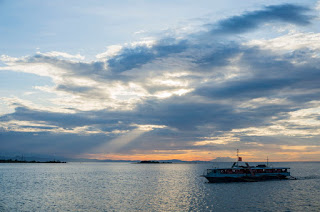Spots to Visit in Butuan City
1. Balanghai Shrine Museum
Admission: Free
Opening Hours: Mondays-Fridays 9am-4pm; Saturdays, Sundays and holidays by appointment
Directions: Take an R1, R2, R3, or R4 multicab headed to Bancasi Airport. Tell the driver that you're going to the Balanghai Shrine Museum so that he can drop you off at the intersection in Brgy. Libertad. Take a tricycle (Php8) to the museum. Alternatively, instead of taking a tricycle, walk 15-20 mins to the museum, following the main street and keeping right when you reach the junction with a basketball court. Taking the right-hand fork leads to a river, a hanging bridge, and a hill where the first Catholic Mass in the Philippines was supposedly held.
Why Go Here
See an actual balangay and understand how Butuan City came about. This history of the City, as well as of international trading in the Philippines, is closely connected to the existence of the balangays. Also, see a wooden coffin up close including the skulls and treasures that used to be inside them.
 |  |
| Coffins were found alongside the balangays and skeletons were found inside these. | Can you tell which skull is of an older person's and why? |
| A balangay is a wooden watercraft that is evidence of the Filipino craftsmanship and seamanship during pre-colonial times. It is built with planks of hardwood, wooden pegs, grass ropes, and tree resin (for sealing) and usually measure 15 meters in length and 3 meters in width.The boats were normally used for trade across Southeast Asia as early as the 12th century, way before the arrival of Magellan in the Philippines in the 15th century. | |
2. National Museum
Admission: Php20
Opening Hours: Mondays-Fridays 9am-4pm; Saturdays, Sundays and holidays by appointment
Directions: Take an R1, R2, R3, or R4 multicab headed to Bancasi Airport and get off at Gaisano. At the tricycle terminal (Php8), ask for one that can take you to the National Museum. The tricycle will drive northwest and circle around the City Hall which is at a big rotunda. Alternatively, instead of taking a tricycle, walk 30mins to the museum, following the northwest road opposite Gaisano and crossing the street to the National Museum just before you reach the City Hall rotunda.
Note: The National Museum is currently closed for renovation and expansion but some exhibits may still be available for viewing upon proper permission.
Why Go Here
See a depiction of what a balangay might have really looked like. The balangay is believed to be used not only for trading but also for carrying an entire barangay of people. Also, understand the agriculture and fishing heritage of Butuan and of the other ethnolinguistic groups.
3. Magallanes Shrine
Admission: Free
Directions: Take an R4 multicab (Php8) headed to Butuan City. Tell the driver that you are headed to the PPA Ferry Terminal so he can drop you off at the intersection by the Post Office. Walk towards the tricycle terminal with a small basketball court. This leads directly to the entrance of the Ferry Terminal. Register your name and age and get on the ferry (Php25, 45mins).
Why Go Here
Cruise along the Agusan River pass by more archaeological sites and scenic landscapes. Sites located directly beside the river include the Banza Church ruins, the Balangay boat building site (with an actual-sized balangay on display), ship building yards, and abandoned factories. Also, watch the sunset from the Magallanes Shrine Plaza as it disappears behind the open sea.
Suggested Itinerary
With cheaper flights and city comforts, Butuan is an ideal stop-over before going to Siargao. The city-center can easily be explored within a day following the itinerary below:
5:30 ETD Manila-Butuan
8:00 Check-in at preferred accommodation
9:00 Balanghai Shrine Museum
10:30 Butuan National Museum
12:00 Lunch/free time
16:30 Ferry to Magallanes
18:00 Ferry back to Butuan City
Estimated Budget
|
Particulars
|
Rate per Person
|
|
Multicab from Bancasi Airport to city-center
|
Php20
|
|
Tricycle from city-center
to accommodation
|
Php8
|
|
Multicab from city-center to Brgy.
Libertad
|
Php8
|
|
Tricycle to Balanghai
Shrine Museum
|
Php8
|
|
Tricycle back to J.C. Aquino Ave.
|
Php8
|
|
Multicab to Gaisano
|
Php8
|
|
Tricycle to National Museum
|
Php8
|
|
Tricycle back to J.C. Aquino Ave.
|
Php8
|
|
Multicab to PPA Ferry Terminal
|
Php8
|
|
Ferry to Magallanes
|
Php25
|
|
Ferry to Butuan
|
Php25
|
|
Tricycle to city-center
|
Php8
|
|
Total
|
Php142
|
Not included: Meals, Accommodation, Flight
Other Things to do in Butuan City
1. Trek to Tagnote Falls in Remedios T. Romualdez
2. Climb Mt. Hilong-Hilong
3. Watch the Butuanons at the local Rizal Park
4. Sample local bread at Tokaido Bakery and Hayashi Breads





